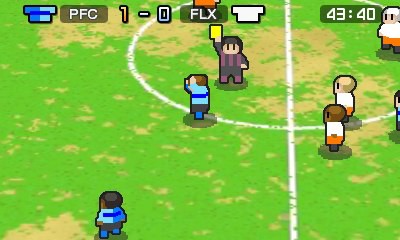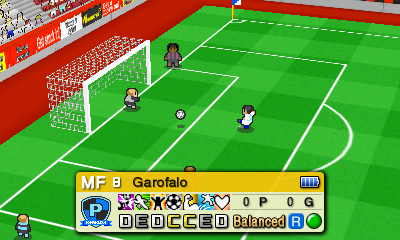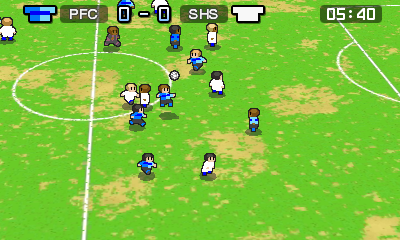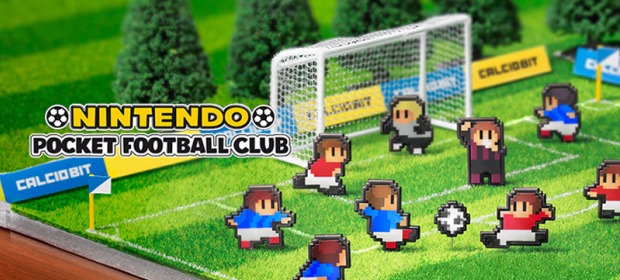Football management is a strange beast. Not only do you have to manage your players, give them training regimes and devise game-winning tactics, but you also have to find and bring new players into your team and then, after all that, you have to win silverware. To say it’s not an easy task is a massive understatement. Nintendo Pocket Football Club aims to simplify management into the main key areas, and it does it very well.
Mind games with other teams or youth squad scouting are nowhere to be seen in NPFC; instead, the core areas of management are your only options. Training, signing and playing is what the core of the game involves, with occasional trips to the Federation Building to check on upcoming fixtures or you managerial career record.
 Training takes place in the aptly named Training Camp, located in the north east of your footballing town. Take a visit there and you can edit your team’s starting line-up along with set-piece-takers and default tactics, or you can watch replays of saved matches and goals. However, the main reason to visit the camp is to improve your players with Training Cards, which are gathered by playing matches.
Training takes place in the aptly named Training Camp, located in the north east of your footballing town. Take a visit there and you can edit your team’s starting line-up along with set-piece-takers and default tactics, or you can watch replays of saved matches and goals. However, the main reason to visit the camp is to improve your players with Training Cards, which are gathered by playing matches.
These cards come in many different forms, ranging from shooting, dribbling and passing through to weight-training, sprinting and even gaming. Each player can use up to three cards per week to improve their stats. The more experienced managers will quickly learn that combining certain cards will result in special training options that will improve stats even more. Some combinations are obvious and make sense, whereas other will leave you scratching your head searching for the link. Discovering a combination is not only extremely helpful in regards to player development, but is also very satisfying, making you feel like a real manager who just came up with a killer training session.
When you first join your team, which you can name and design kits for, you will be given a group of players who will need a lot of work in order to climb to the higher leagues (although for the first season they will serve you well). Should you feel that your team needs more depth (which it most certainly will once you gain promotion) or one more killer player then you can head to the office building to sign new talent. You are given a very reasonable budget in order to enhance your team, which makes bringing squad numbers up quite easy, although some players will be just out of financial reach.

Combining training and signing new players is the real key to success, tactics play a very small part in each individual match but generally the team with the better players will come out on top. Once you get a solid team you are happy with, signing players becomes almost irrelevant, as training up your team will be just effective.
Obviously, the most important location in your small town is the stadium. Mandatory league and cup matches occur almost every week, but if you find a free Saturday you can arrange practice or friendly matches in order to gain more training cards and give the fans something to watch.
Somewhat annoyingly you are forced to watch every single game, each of which last about 8 minutes, and there is no option to speed it up. At first each game has an air of excitement when watching, but soon having to sit through often boring matches becomes tiresome. The pixelated art style combined with incredibly cute animations makes the viewing a little more entertaining, but often the quality of the football will counteract this.
When in the lower leagues the long-ball style of play, which is horrible to watch, is the only thing players appear to know. Although not eradicated entirely in higher leagues it does get better and therefore more entertaining, but getting to that stage will mean watching a lot of awful football.
 The on-the-pitch action certainly isn’t enjoyable and quickly becomes more of a chore. Unless a player is injured or fatigued (which isn’t often) there is little need to make substitutions unless you want to change tactics, which doesn’t seem to do a lot. You can set the main zone of play, select a player to mark and choose whether to go on all-out attack of wait for opportunities, which all seem to be ignored for the most part, except for zones which the players stick to religiously (and stupidly) at times.
The on-the-pitch action certainly isn’t enjoyable and quickly becomes more of a chore. Unless a player is injured or fatigued (which isn’t often) there is little need to make substitutions unless you want to change tactics, which doesn’t seem to do a lot. You can set the main zone of play, select a player to mark and choose whether to go on all-out attack of wait for opportunities, which all seem to be ignored for the most part, except for zones which the players stick to religiously (and stupidly) at times.
VERDICT: Building and training a team in Nintendo Pocket Football Club is a blast, and seeing players develop and climbing up the leagues is insanely satisfying. The use of training cards and their combinations is a great idea that is implemented in a simple way but still makes you feel like a masterful coach. Where the game falls down is on the pitch itself. Being forced to watch 8-minute games not only feels like a waste of time but also becomes incredibly boring after the first season or so. A simple option to sim a match or even speed up the play would fix this issue, but alas it is not to be.
With four leagues and three cup competitions to win there is a lot of playtime on offer and most of it will be enjoyable, providing you can put up with watching every single game your team ever plays.

GOOD. A game that scores 7/10 is worthy of note, but unworthy of fanfare. It does many things well, but only a few of them incredibly well and, despite a handful of good qualities, fresh ideas and solid mechanics, it fails to overwhelm.
Review code provided by publisher. Both local and online multiplayer will be featured on release, however this was unavailable to test at the time of review.






